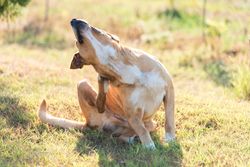
It’s not uncommon to find dogs having fun on a grassy lawn. Despite their love of being in nature, some pups can have allergic reactions from too much frolicking on the turf. According to pet care specialists, however, dog allergies are treatable. Here’s a closer look at how such a reaction happens and what you should do about it.
What Causes Grass Allergies?
As a dog owner, you may notice that your pet feels uncomfortable after spending some time on the grass. While it’s possibly an allergic reaction, it’s not because of the grass blades per se but the pollen. Like any seed-bearing plant, grass releases pollen spores into the air during spring and summer. Inhaling these airborne allergens—even in small amounts—can trigger a reaction in your canine, similar to humans.
What Are the Symptoms?
Itchiness
 The primary symptom of an allergy is extreme itchiness—your dog will constantly scratch, lick, and bite their skin. When prolonged, it may result in wounds, scabs, infection, rashes, and bald spots on the head, underarms, belly, groin, feet, and paws.
The primary symptom of an allergy is extreme itchiness—your dog will constantly scratch, lick, and bite their skin. When prolonged, it may result in wounds, scabs, infection, rashes, and bald spots on the head, underarms, belly, groin, feet, and paws.
Sneezing or Wheezing
While more pronounced in humans, dogs can also suffer from anaphylaxis, an inflammation in the airway that constricts breathing. If you notice your pet sneezing, wheezing, or coughing more than usual, it may be a severe allergic reaction that requires a veterinarian’s attention at once.
Red, Runny Eyes
Grass allergies can cause your dog to have watery eyes and nose, so be on the lookout for these symptoms as well.
How to Treat It
Grass allergies in dogs are sometimes misdiagnosed, so it’s vital to consult with a trusted pet care expert at the onset of symptoms. Some vets advise testing for other possible allergens to diagnose correctly, but in the meantime, they can prescribe treatment to manage the symptoms. Severe cases call for aggressive treatment, including antihistamines, short-term doses of steroids, and medications. Oral or topical omega-3 fatty acid supplements can ease itchiness and inflammation.
For mild allergies, you can address these by reducing your dog’s exposure to allergens during the season. Mow your lawn regularly to prevent excess pollen from being released. After going outside, wash their feet thoroughly and pay attention to spaces in between toes. Bathe them frequently using hypoallergenic shampoo to get rid of remaining pollen spores on their coats.
At the first signs of allergies, take your canine companion to Animal Care Center of Fairfield. As the trusted animal hospital in Butler County, OH, their veterinarians provide top-notch pet care services, such as health exams, vaccinations, dental checkups, and daycare. Call (513) 829-6621 for an emergency vet or learn more about their comprehensive wellness care online.
About the Business
(22 reviews)
Have a question? Ask the experts!
Send your question

